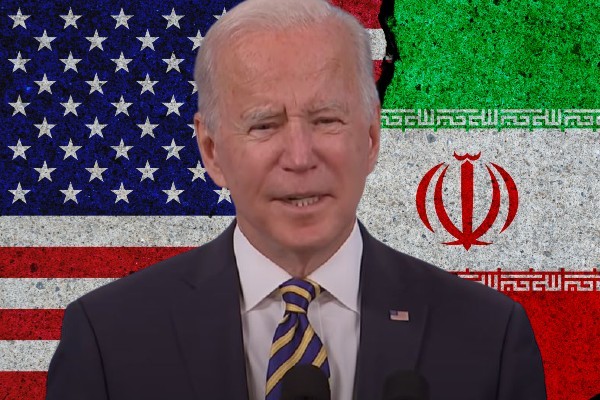Iran’s infrastructure for enriching uranium would not be dismantled nor would its stockpile of illicitly enriched material be touched, says report.
By Pesach Benson, United With Israel
Concern is growing in Jerusalem that U.S. President Joe Biden will settle for a partial nuclear agreement more limited than even the JCPOA agreement negotiated by President Barack Obama’s administration in 2015, Israel Hayom reported on Sunday.
According to the report, Israeli officials fear the U.S. will be satisfied with an agreement that ends the current sanctions on Iran if the Islamic regime simply ceases its uranium enrichment.
“Such an outline would mean, among other things, that Iran’s advanced infrastructure for enriching uranium would not be dismantled, the 25 kilograms of uranium that Iran has already enriched to 60% in violation of the original deal would remain untouched, and that Iran’s nuclear program in general or its regional belligerence would not be addressed,” Israel Hayom wrote.
“A narrow agreement of this sort would also contravene the assurances previously issued by the US administration to reach a “stronger and longer-term” deal than the original,” the paper added.
Israeli officials believe that Tehran’s decision to return to the talks is a ploy to buy time and that neither Ayatollah Ali Khamenei nor President Ebrahim Raisi have any intention to returning to the JCPOA.
On Friday, Rafael Grossi, director-general of the International Atomic Energy Agency (IAEA), said that the new Iranian government has not contacted him at all since Raisi’s cabinet was sworn into office in August.
“This is astonishing, and I am saying it openly because I’m saying it to them,” Grossi said. “There’s a long list of things we need to discuss.”
Reports indicate the IAEA has a long list of concerns regarding access to nuclear facilities and undeclared sites.
Robert Malley, a State Department veteran and now the U.S. envoy for Iran, is due to arrive in Israel on Sunday for two days of talks with Israeli officials. Malley raised Israeli concerns in October when he told reporters, “The window of diplomacy is never going to be closed.”
According to Israel Hayom, Prime Minister Naftali Bennett is boycotting talks with Malley.
Explaining Bennett’s boycott, a source told Israel Hayom that “Israel doesn’t want to be perceived in any way as legitimizing the renewal of talks with Iran [in Vienna] later this month.”
Israeli officials will remember Malley for working on President Bill Clinton’s team of negotiators during the failed Camp II summit of 2000. Two years later, as the Second Intifada raged, Malley wrote a series of articles in the New York Review of Books revising history to blame Israel for the collapse of the talks between Israeli Prime Minister Ehud Barak and Palestinian chief Yasser Arafat.
Those articles positioned Malley as soft on Palestinian terror and reinforced Israeli views that he is soft on Iran as well.
The visit is Malley’s first trip abroad as U.S. envoy for Iran. He will meet with various senior Israeli diplomatic, intelligence and security officials before continuing on to Saudi Arabia, the United Arab Emirates and Bahrain, where leaders are just as skeptical of Washington’s diplomacy.
In October, Iranian Foreign Minister Hossein Amir-Abdollahain demanded the U.S. unfreeze at least $10 billion to demonstrate its sincerity on rejoining the Joint Comprehensive Plan of Action (JCPOA) agreement.
Ahead of Malley’s arrival, Israel’s former ambassador to the U.S., Michael Oren, told the Jerusalem Post: “Israel must make it unequivocally clear to Rob Malley that it cannot tolerate Iran’s achievement of threshold capacity that is the ability to make nuclear weapons within a matter of weeks or even days.”
Oren also insisted to the Post that “Israel must also make it unequivocally clear that any agreement with Iran must effectively block its path to a threshold capacity by physically dismantling its nuclear infrastructure, and by greatly extending the sunset clauses.
“Israel should demand concrete measures to stop Iran’s intercontinental ballistic missile system and its development of a nuclear warhead. America can maybe coexist with a threshold Iran, but Israel can’t.”
The JCPOA agreement of 2015 was signed by Iran along with with the five permanent members of the UN Security Council — the U.S., Russia, China, France and Britain — as well as the European Union and Germany. Israel, Saudi Arabia and the Gulf states vehemently opposed the agreement. President Donald Trump withdrew the U.S. from the JCPOA in 2018.
President Biden has made returning to the nuclear agreement a key foreign policy goal. Indirect negotiations between the U.S. and Iran are scheduled to begin in Vienna on November 29.
Bring Joy to Israeli Soldiers - Send Winter Care Packages!
We are honored to thank the young men and women of the IDF who risk their lives every day to defend the citizens of Israel.
Join us in sending winter care packages and personal notes of support to Israeli soldiers who are out in the cold all day.
Warm up a soldier's heart with essential winter wear including fleece jackets, hats, gloves and more. Keep an entire unit warm!
THE SOLDIERS REALLY APPRECIATE YOUR LOVE AND CONCERN!
Click Here to Send Your Gift and Personal Note to Israeli Soldiers
Do You Love Israel? Make a Donation - Show Your Support!
Donate to vital charities that help protect Israeli citizens and inspire millions around the world to support Israel too!
Now more than ever, Israel needs your help to fight and win the war -- including on the battlefield of public opinion.
Antisemitism, anti-Israel bias and boycotts are out of control. Israel's enemies are inciting terror and violence against innocent Israelis and Jews around the world. Help us fight back!
